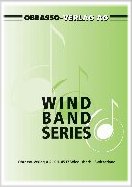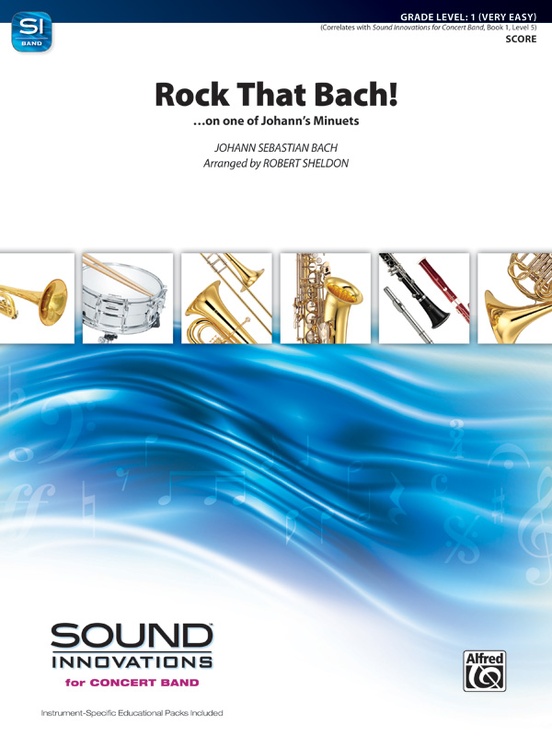Results
-
 £60.00
£60.00Magic Bach - Jérôme Naulais
Estimated dispatch 7-14 working days
-
 £39.60
£39.60Bach for Band (Concert Band - Score and Parts)
A garden fresh mix of delightful options are contained in this wonderful selection by popular composer Don Schaeffer. This excellent programming choice featuring the flute section has been a true staple in the Barnhouse catalog for many years.
Estimated dispatch 7-14 working days
-
 £31.68
£31.68Bach To the Future (Concert Band - Score and Parts)
Traditional march favorites that can be performed by younger ensembles. Shaffer has crafted this contemporary medley of three of the most famous march melodies of all time; National Emblem, Colonel Bogey and The Billboard March.
Estimated dispatch 7-14 working days
-
 £84.60
£84.60POP LOOKS BACH (Intermediate Band) - Fonteyn, Sam - Woodfield, Ray
Medium
Estimated dispatch 7-14 working days
-
 £49.50
£49.50Three Bach Chorales (Concert Band - Score and Parts) - Sousa, John Philip
-
Estimated dispatch 7-14 working days
-
 £49.95
£49.95Rock That Bach!
Bach's "Minuet in G Major" provides the inspiration for this lively rock-style piece for young bands. A statement of the original theme gives way to a rousing rock version of this famous melody. Correlated to Book 1, Level 5 of , this selection is playable by young players in their first year of training and provides a great toe-tapping tune for your appreciative audience. (1:30)
Estimated dispatch 3-5 working days
-
 £435.40
£435.40Goldberg 2012 - Svein H. Giske
The first time I heard Bach's Goldberg Variations was in the movie Silence of the lambs, in the early 1990s. I noticed the beautiful background music in one of the scenes, but at that time I didn't know what it was. A few years later, when I was studiying at the Grieg Academy, I got to know the entire piece. For me, this is a piece of music which I can listen to countless times. I think it sounds as fresh today as it did more than 15 years ago and it never ceases to inspire me. Both Bach's composition and Glenn Gould's famous 1955 recording (which was the first one I heard) still makes a great impression on me. Before Gould recorded it at age 22, it wasn't a highly ranked piece amongst pianists and Bach was by many viewed as a bit old-fashioned. The young Canadian turned all this around. He managed to portray Bach in a reformed way, producing fine nuances in phrasing and making the many layers in Bach's music more transparent than anyone before him. Thus he plunged both himself and Bach (back) onto the international music scene. When The Norwegian Band Federation (NMF) asked me to write the test piece for NM in 2012, it was only natural for me to use the Goldberg Variations as a starting point and inspiration for my work. Since I was a teenager at NMF's summer courses in the mid eighties I've always listened to many different styles of music. Growing up in Sunnmre with the Brazz Brothers as teachers and mentors, jazz-, pop/rock- and folk music were early on a natural part of my musical background. I also have my classical education from the Grieg Academy on trumpet. As the title of my piece implies, I've wanted to bring Bach to the present and put his music into various modern musical landscapes. I think you can bring about a special kind of energy when music from different genres are mixed and I've tried to do this by mixing Bach with artists and musical styles from the present. In Goldberg 2012, the music is often constructed by several layers, which in a way are living parallel musical lives. They are seemingly moving or floating freely, almost unaware of each other, but bound together by the same basic pulse. The rythms, however, are often notated on a different rythmic subdivision level than the usual 8th- or 16th note levels. By doing this, I hope to achieve transparent sounds that rythmically are perceived as more free and detached from each other. In large sections of the piece, pop/jazz is fusioned with elements from Bach. I guess you could have this little scene as a synopsis for the piece: picture a group of musicians meeting: some are classical performers, some are jazz. They start to improvise together, each in their own voice or musical dialect and I'm sort of in the middle, trying to write down what they are playing. This is what I feel much of Goldberg 2012 is about. The foundation of the piece, in addition to Bach and references from pop/jazz music, lies also in my own material. This material, basically two chords, is heard in it's purest form in the 1st movement. I use these chords to create scales, new chords and different motifs which contribute to blend together the different moods of the piece. It has not been my intention to copy Bach's form (theme and 30 variations), but rather to use the bits and pieces that I like the most as an inspiration for my own variations. The 1st movement, Aria 2, is for my 3rd son, Olav, who was born on the 21st of April 2011, and the 5th movement, From long ago, is dedicated to the memory of my father, Svein J. Giske, who passed away on the 6th of June 2011. -Svein H. Giske, January 2012-
Estimated dispatch 7-14 working days
-
 £78.09
£78.09Temperamental (Concert Band) Fendall Hill
This work by Fendall Hill was the set test for the 2021 National Brass Band Championships of New Zealand, B Grade. Here it has been adapted for Concert Band. The composer writes: 'J.S. Bach (1685-1750) is deemed by many to be the 'Ulimate Composer'. He added an incredible proportion to the DNA of western music, and his influence is heard in the music of today. Like many artists, he was not overly recognised as a composer during his lifetime, and it took an 1829 performance of the St Matthew Passion by Mendelssohn to ignite a recognition of his place in the music world, a place he has maintained ever since. This piece starts with a similar spark of rediscovery of the music of Bach. It contains arrangements of various works, interspersed with composition based on Bach's chord structures, sections in the style of Bach, and original sections inspired by the moods created along the way. The first section explores the Toccata, and great organ works. This leads into an exploration of his choral works, and a finale based on the Preludes. The word 'Tempered' has different meanings, and all seem to apply to the music of Bach, and these appeal to the musical, engineering and spiritual aspects of my personal life. His music reaches to the humanity and divinity, it has strength, structure and order that creates frameworks in which incredible complexity reigns; and the complexity leads to a wildness, a kind of craziness that represents a range of human moods, and can change without warning. The same piece of music affects people in very different ways. I don't know if it's Bach's music, or us, but it can seem out of control and under control at the same time - the combination is highly temperamental. To view a follow-the-score video of the work please visit: https://youtu.be/6CtYZmCoWIc Sheet music available from: UK: www.wind-band-music.co.uk USA: www.solidbrassmusic.com Difficulty Level: Advanced Instrumentation: Instrumentation: Piccolo Flute 1-2 Oboe Bassoon Clarinet in Bb 1-3 Bass Clarinet in Bb Alto Saxophone 1-2 Tenor Saxophone Baritone Saxophone Trumpet in Bb 1-3 Horn in F 1-4 Trombone 1-2 Bass Trombone Euphonium Tuba Double Bass Timpani Percussion 1-3
In stock: Estimated dispatch 1-3 days
-
 £76.99
£76.99Memories of Leipzig
The name of Johann Sebastian Bach (1685-1750) is inextricably connected to the German city of Leipzig. This modest and very dutiful master composer worked like a diligent civil servant. From 1723 until his death in 1750, he was cantor of the Thomaskirche in Leipzig. Since the beginning of the 20th century, the Bach Festival takes place in this city every year. The hallmark of Leipzig is internationality: every year, soloists come from far and near to perform the baroque music again. The Bach Festival inspired the Dutch composer Henk Hogestein to write Memories of Leipzig, which is based on a theme from one of Bach's arias.
Estimated dispatch 7-14 working days
-
 £94.99
£94.99Song of Adoration - Roland Kernen
The melody Praise to the Lord, the Almighty (heard in Bach's cantata BWV 137) has its origin in 17th century Germany, and is included in the hymnbook Freylinghausen's Geistreiches Gesangbuch. This hymnbook originates from the beginning of the 18th century and is considered one of the most significant collections of Lutheran chorales published in Bach's time.This beautiful new work for concert band is based on the internationally known and loved chorale and will make an ideal serene interlude in any concert.
Estimated dispatch 7-14 working days
